| Listing 1 - 10 of 17 | << page >> |
Sort by
|
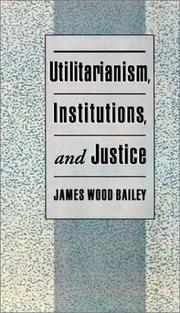
ISBN: 1280452714 0195355679 1602561249 0585203024 9780585203027 9781602561243 9780195105100 0195105109 9781280452710 0195105109 9780195355673 0197734375 Year: 1997 Publisher: New York, N.Y. Oxford University Press
Abstract | Keywords | Export | Availability | Bookmark
 Loading...
Loading...Choose an application
- Reference Manager
- EndNote
- RefWorks (Direct export to RefWorks)
This text advances utilitarianism as the basis for a viable public philosophy, rebutting charges that, as moral doctrine, utilitarian thought permits cruel acts, justifies unfair distribution of wealth, and demands too much of moral agents. The author defends utilitarianism using game theory.
Utilitarianism. --- Institutions (Philosophy) --- Justice (Philosophy) --- Philosophy --- Ethics --- Hedonism --- Utilitarianism
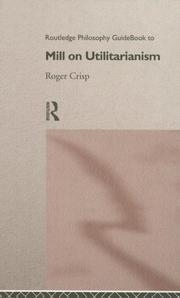
ISBN: 0415109779 0415109787 9780415109789 Year: 1997 Publisher: London Routledge
Abstract | Keywords | Export | Availability | Bookmark
 Loading...
Loading...Choose an application
- Reference Manager
- EndNote
- RefWorks (Direct export to RefWorks)
Mill was one of the most important British philosophers of the 19th century. This guidebook is ideal for advanced students new to Mill, and even philosophy.
Utilitarianism. --- Mill, John Stuart, --- General ethics --- Mill, John Stuart --- Utilitarianism --- Ethics --- Hedonism --- Philosophy
Book
ISBN: 2253942545 9782253942542 Year: 1997 Volume: 4254 Publisher: Paris : Librairie Générale Française (L.G.F.),
Abstract | Keywords | Export | Availability | Bookmark
 Loading...
Loading...Choose an application
- Reference Manager
- EndNote
- RefWorks (Direct export to RefWorks)
Taste --- Hedonism --- Gastronomy --- Goût --- Hédonisme --- Gastronomie --- Philosophy --- Philosophie --- Goût --- Hédonisme

ISBN: 1280105054 0203410610 9780203410615 9780415109772 0415109779 0415109787 9780415109789 9786610105052 6610105057 9781134837199 9781134837236 9781134837243 1134837232 1134837240 Year: 1997 Publisher: London New York Routledge
Abstract | Keywords | Export | Availability | Bookmark
 Loading...
Loading...Choose an application
- Reference Manager
- EndNote
- RefWorks (Direct export to RefWorks)
This book introduces and assesses Mill's life and the background of Utilitarianism and its continuing importance to philosophical thought.
Utilitarianism. --- Philosophy. --- Utilitarianism --- Philosophy --- Philosophy & Religion --- Ethics --- Hedonism --- Mill, John Stuart, --- 穆勒 --- Mill, John Stuart.
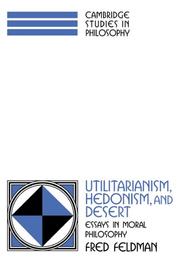
ISBN: 0521591554 0521598427 1139174975 9781139174978 9780521591553 9780521598422 Year: 1997 Volume: *22 Publisher: Cambridge Cambridge University Press
Abstract | Keywords | Export | Availability | Bookmark
 Loading...
Loading...Choose an application
- Reference Manager
- EndNote
- RefWorks (Direct export to RefWorks)
Fred Feldman is an important philosopher, who has made a substantial contribution to utilitarian moral philosophy. This collection of ten previously published essays plus a new introductory essay reveal the striking originality and unity of his views. Feldman's version of utilitarianism differs from traditional forms in that it evaluates behaviour by appeal to the values of accessible worlds. These worlds are in turn evaluated in terms of the amounts of pleasure they contain, but the conception of pleasure involved is a novel one and the formulation of hedonism improved. In Feldman's view pleasure is not a feeling but a propositional attitude. He also deals with problems of justice that affect standard forms of utilitarianism. The collection is ideally suited for courses on contemporary utilitarian theory.
General ethics --- Ethics --- Ethiek --- Ethique --- Hedonism --- Hedonisme --- Hédonisme --- Utilitarianism --- Utilitarisme --- Ethics. --- Hedonism. --- Utilitarianism. --- Eudemonism --- Deontology --- Ethics, Primitive --- Ethology --- Moral philosophy --- Morality --- Morals --- Philosophy, Moral --- Science, Moral --- Philosophy --- Asceticism --- Cyrenaics (Greek philosophy) --- Pleasure --- Values --- Arts and Humanities
Book
ISSN: 12488836 ISBN: 2130480578 9782130480570 Year: 1997 Publisher: Paris: PUF,
Abstract | Keywords | Export | Availability | Bookmark
 Loading...
Loading...Choose an application
- Reference Manager
- EndNote
- RefWorks (Direct export to RefWorks)
Ethics --- Ethics, Modern --- Hedonism --- Happiness --- Benevolence --- Morale --- Hédonisme --- Bonheur --- Bienveillance --- Moral and ethical aspects --- Aspect moral --- --Philosophie --- --Éthique --- --Bonheur --- --Ethics --- Hédonisme --- Philosophie --- Éthique --- Bonheur (philosophie) --- Bienveillance.
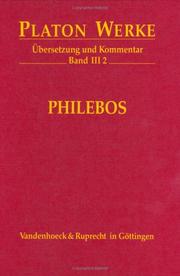
ISBN: 3525304099 9783525304099 Year: 1997 Volume: III, 2 Publisher: Göttingen Vandenhoeck und Ruprecht
Abstract | Keywords | Export | Availability | Bookmark
 Loading...
Loading...Choose an application
- Reference Manager
- EndNote
- RefWorks (Direct export to RefWorks)
Pleasure --- Plaisir --- Plato. --- Pleasure. --- Philosophy --- -Mental philosophy --- Humanities --- Early works to 1800 --- -Early works to 1800 --- Emotions --- Ethics --- Senses and sensation --- Utilitarianism --- Happiness --- Hedonism
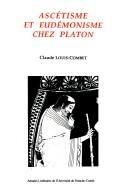
ISBN: 2251606262 2848676868 9782251606262 Year: 1997 Volume: 626 79 Publisher: Besançon : Annales littéraires de l'Université de Franche-Comté,
Abstract | Keywords | Export | Availability | Bookmark
 Loading...
Loading...Choose an application
- Reference Manager
- EndNote
- RefWorks (Direct export to RefWorks)
Cet ouvrage qui fut d’abord un travail d’étudiant (1962) a pris tout son sens, au fil du temps, par rapport à une œuvre d’écrivain dont l’auteur pas plus qu’un autre, ne pouvait entendre qu’à propos de Platon le prélude était donné. Des nombreuses fictions qui allaient suivre et des réflexions qui prendraient forme et de l’œuvre opérée dans le champ de la littérature spirituelle, la fondamentale inclination du cœur vers le platonisme ne cesserait jamais de s’avouer comme désir d’unité et d’immobile éternité, comme rêverie androgynique, comme inspiration d’amour, vertige de beauté, passion de réminiscence. Le jeune homme qui réfléchissait sur les rapports dialectiques de l’ascèse et du bonheur chez l’auteur du Banquet, afin de les comparer à l’enseignement de la tradition mystique chrétienne, s’avançait, presque à son insu, sur un chemin d’intériorité qui ne devait le conduire, sans doute, ni à une plus claire connaissance de soi, ni à une illumination théophanique, mais du moins à l’acharnement d’écriture et de création – signifiant par là, s’il était encore besoin de le dire, et dans un cas tout particulier, la permanente fécondité de la parole platonicienne.
Asceticism. --- Hedonism. --- Philosophy, Ancient. --- Classics --- Philosophy --- tradition --- mystique chrétienne --- littérature --- platonisme --- réminiscence --- ascèse --- intériorité --- connaissance de soi --- Ascetisme --- Platon (428-348 av. j.c.) --- Critique et interpretation
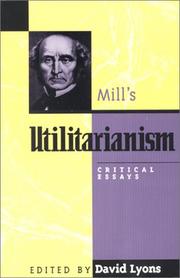
ISBN: 084768783X 0847687848 Year: 1997 Publisher: Totowa Rowman & Littlefield
Abstract | Keywords | Export | Availability | Bookmark
 Loading...
Loading...Choose an application
- Reference Manager
- EndNote
- RefWorks (Direct export to RefWorks)
Utilitarianism. --- Philosophy, English --- Ethics, Modern --- Utilitarisme --- Philosophie anglaise --- Morale moderne --- Mill, John Stuart, --- 1 MILL, JOHN STUART --- Utilitarianism --- Ethics --- Hedonism --- Philosophy --- Filosofie. Psychologie--MILL, JOHN STUART --- Mill, John Stuart --- 1 MILL, JOHN STUART Filosofie. Psychologie--MILL, JOHN STUART
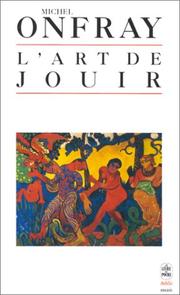
ISBN: 2253941980 9782253941989 Year: 1997 Volume: 4198 Publisher: Paris Librairie générale française
Abstract | Keywords | Export | Availability | Bookmark
 Loading...
Loading...Choose an application
- Reference Manager
- EndNote
- RefWorks (Direct export to RefWorks)
130.2 --- 130.2 Filosofie van de cultuur. Cultuurfilosofie. Cultuursystemen. Kultuurfilosofie --- Filosofie van de cultuur. Cultuurfilosofie. Cultuursystemen. Kultuurfilosofie --- Hedonism --- Pleasure --- Human body (Philosophy) --- Sexual ethics --- Sense (Philosophy) --- Hédonisme --- Plaisir --- Corps humain (Philosophie) --- Morale sexuelle --- Sensibilité (Philosophie)
| Listing 1 - 10 of 17 | << page >> |
Sort by
|

 Search
Search Feedback
Feedback About UniCat
About UniCat  Help
Help News
News